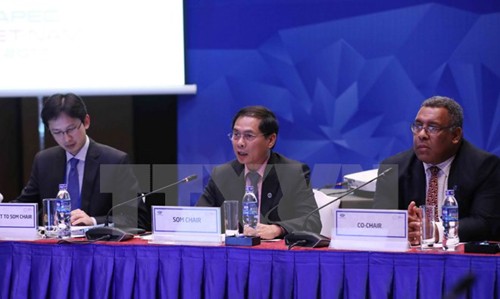(VOVWORLD) - At a dialogue in Ho Chi Minh City on Sunday, APEC officials agreed to further strengthen regional economic links and promote Regional Trade Agreements (RTAs) and Free Trade Agreements (FTAs) and soon establish a Free Trade Area of Asia Pacific. The APEC Senior Officials Meeting (SOM) Dialogue on RTAs/FTAs brought together APEC senior officials, official observers, speakers, and representatives from the businesses community.
 Deputy Foreign Minister Bui Thanh Son addresses the dialogue Deputy Foreign Minister Bui Thanh Son addresses the dialogue
|
For the past 30 years, RTAs and FTAs in the APEC region have grown in number, scope and sophistication. APEC members signed in 165 FTAs and RTAs including 62 intra-APEC agreements. The number of new-generation Free Trade Agreements has increased focusing on trade, investment, and non-tariff barriers.
FTAs’ impact on economic growth
In the context of regional and global economic recovery, making the most of RTAs/FTAs is important to create new dynamism for economic growth, trade and investment in the region. Free Trade Agreements bring about enormous benefits for economic growth, market access, FDI attraction, and the domestic institutional reforms. Thanks to FTAs, intra-APEC trade has increased from 2.3 trillion USD to 6.3 trillion USD during the 2000-2016 period. Professor Jeff Schott of the Peterson International Economic Institutes said: “The current regional arrangements are getting more and more comprehensive and getting more and more aspects of domestic economic policies which is crucial for economic growth. I think as APEC countries study the ex-arrangement, they will learn more about the combination of policies and reforms to suite their own economies and promote economic growth.”
Marie Sherylyn Aquia is Chair of the APEC Committee for Investment and Trade: “Generally, APEC countries have been the most prolific engaged in FTAs and RTAs. They are the most prolific users and negotiators of FTAs. Vietnam has strategic plans already on how to undertake collaboration with other countries.”
Vietnam promotes negotiation, signing, and implementation of FTAs, RTAs
Given the impacts of the fourth industrial revolution, a key question is how to make the most of the socio-economic benefits that FTAs bring while mitigating adverse impacts like greater income disparity. Deputy Foreign Minister Bui Thanh Son says the status of a low-middle income country is a disadvantage for Vietnam in FTA negotiation: “Countries with a higher economic development level all shared Vietnam’s disadvantages during FTA negotiations. Vietnam always proposed an appropriate roadmap for trade agreements to enable enterprises and localities to better prepare and participate more effectively.”
Robert Holleyman, President and CEO of C&M International, LLC, says signed trade agreements help Vietnam increase exports, promote international transactions, generates more jobs, and attracts more investors.
Strengthening regional economic links through FTAs and RTAs is one of the focuses of APEC cooperation. APEC is in the process of realising the Bogor Goals of trade and investment liberalization and facilitation by 2020 as well as shaping a vision for the realisation of a Free Trade Area of Asia Pacific.